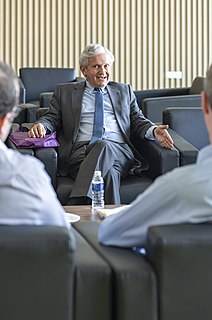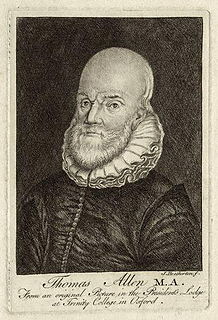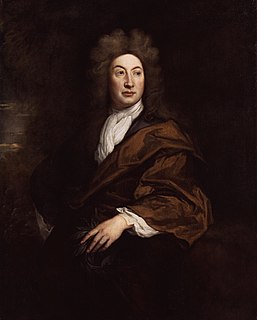Related Research Articles

The Keeper or Master of the Rolls and Records of the Chancery of England, known as the Master of the Rolls, is the President of the Civil Division of the Court of Appeal of England and Wales and Head of Civil Justice. As a judge, he or she is the second in seniority in England and Wales only to the Lord Chief Justice. The position dates from at least 1286, although it is believed that the office probably existed earlier than that.

Thomas Allen was an English mathematician and astrologer. Highly reputed in his lifetime, he published little, but was an active private teacher of mathematics. He was also well connected in the English intellectual networks of the period.

The British Critic: A New Review was a quarterly publication, established in 1793 as a conservative and high-church review journal riding the tide of British reaction against the French Revolution. The headquarters was in London. The journal ended publication in 1843.

The Poet Laureate of the United Kingdom is an honorary position appointed by the monarch of the United Kingdom, currently on the advice of the prime minister. The role does not entail any specific duties, but there is an expectation that the holder will write verse for significant national occasions. The origins of the laureateship date back to 1616 when a pension was provided to Ben Jonson, but the first official holder of the position was John Dryden, appointed in 1668 by Charles II. On the death of Alfred Lord Tennyson, who held the post between November 1850 and October 1892, there was a break of four years as a mark of respect; Tennyson's laureate poems "Ode on the Death of the Duke of Wellington" and "The Charge of the Light Brigade" were particularly cherished by the Victorian public. Five poets, Philip Larkin, Thomas Gray, Samuel Rogers, Walter Scott and Rudyard Kipling turned down the laureateship. The holder of the position as at January 2022 is Simon Armitage who succeeded Carol Ann Duffy in May 2019.

The Lieutenant of the Tower of London serves directly under the Constable of the Tower. The office has been appointed at least since the 13th century. There were formerly many privileges, immunities and perquisites attached to the office. Like the Constable, the Lieutenant was usually appointed by letters patent, either for life or during the King's pleasure.

Justice of the Common Pleas was a puisne judicial position within the Court of Common Pleas of England and Wales, under the Chief Justice. The Common Pleas was the primary court of common law within England and Wales, dealing with "common" pleas. It was created out of the common law jurisdiction of the Exchequer of Pleas, with splits forming during the 1190s and the division becoming formal by the beginning of the 13th century. The court became a key part of the Westminster courts, along with the Exchequer of Pleas and the Court of King's Bench, but with the Writ of Quominus and the Statute of Westminster, both tried to extend their jurisdiction into the realm of common pleas. As a result, the courts jockeyed for power. In 1828 Henry Brougham, a Member of Parliament, complained in Parliament that as long as there were three courts unevenness was inevitable, saying that "It is not in the power of the courts, even if all were monopolies and other restrictions done away, to distribute business equally, as long as suitors are left free to choose their own tribunal", and that there would always be a favourite court, which would therefore attract the best lawyers and judges and entrench its position. The outcome was the Supreme Court of Judicature Act 1873, under which all the central courts were made part of a single Supreme Court of Judicature. Eventually the government created a High Court of Justice under Lord Coleridge by an Order in Council of 16 December 1880. At this point, the Common Pleas formally ceased to exist.
Eastman's Royal Naval Academy, originally in Southsea and later at Winchester, both in England, was a preparatory school. Between 1855 and 1923 it was known primarily as a school that prepared boys for entry to the Royal Navy. Thereafter, it was renamed Eastman's Preparatory School and continued until the 1940s. According to Jonathan Betts, it was "considered one of the top schools for boys intended for the Navy".
Edward William Grinfield (1785–1864) was an English biblical scholar.
The Evangelical Magazine was a monthly magazine published in London from 1793 to 1904, and aimed at Calvinist Christians. It was supported by evangelical members of the Church of England, and by nonconformists with similar beliefs. Its editorial line included a strong interest in missionary work.
The Phytologist was a British botanical journal, appearing first as Phytologist: a popular botanical miscellany. It was founded in 1841 as a monthly, edited by George Luxford. Luxford died in 1854, and the title was taken over by Alexander Irvine and William Pamplin, who ran it to 1863 with subtitle "a botanical journal".
References
- ↑ "Fellows of the Royal Society". London: Royal Society. Archived from the original on 2015-03-16.
- ↑ Takahashi, Y. (1990). "William Edward Ayrton at the Imperial College of Engineering in Tokyo-the first professor of electrical engineering in the world". IEEE Transactions on Education. 33 (2): 198–205. Bibcode:1990ITEdu..33..198T. doi:10.1109/13.54861. ISSN 0018-9359.
- ↑ Stearn, William T. (1981). "Henry Walter Bates (1825–1892), discoverer of Batesian mimicry". Biological Journal of the Linnean Society. 16 (1): 5–7. doi:10.1111/j.1095-8312.1981.tb01835.x. ISSN 0024-4066.
- ↑ "William Henry Mahoney Christie". Oxford Dictionary of National Biography (online ed.). Oxford University Press. doi:10.1093/ref:odnb/32409.(Subscription or UK public library membership required.)
- ↑ "George Dickie". Oxford Dictionary of National Biography (online ed.). Oxford University Press. doi:10.1093/ref:odnb/7602.(Subscription or UK public library membership required.)
- ↑ "William Ewart Gladstone". Oxford Dictionary of National Biography (online ed.). Oxford University Press. doi:10.1093/ref:odnb/10787.(Subscription or UK public library membership required.)
- ↑ "Mountstuart Grant Duff". Oxford Dictionary of National Biography (online ed.). Oxford University Press. doi:10.1093/ref:odnb/33518.(Subscription or UK public library membership required.)
- ↑ O'Connor, John J.; Robertson, Edmund F., "Alfred Bray Kempe", MacTutor History of Mathematics archive , University of St Andrews
- ↑ Barclay-Smith, E. (1919). "Professor Alexander Macalister, M.D., F.R.S., etc. 1844–1919". Journal of Anatomy. 54 (1): 96–99. PMC 1262915 .
- ↑ "Herbert McLeod". Oxford Dictionary of National Biography (online ed.). Oxford University Press. doi:10.1093/ref:odnb/39359.(Subscription or UK public library membership required.)
- ↑ "John Arthur Phillips". Oxford Dictionary of National Biography (online ed.). Oxford University Press. doi:10.1093/ref:odnb/22164.(Subscription or UK public library membership required.)
- ↑ "Dr. Bindon Blood Stoney, F.R.S". Nature. Nature Publishing Group. 80 (2063): 315. 1909. Bibcode:1909Natur..80Q.315.. doi: 10.1038/080315a0 .
- ↑ "Ramsey Heatley Traquair". Oxford Dictionary of National Biography (online ed.). Oxford University Press. doi:10.1093/ref:odnb/48896.(Subscription or UK public library membership required.)
- ↑ "Henry William Watson". Oxford Dictionary of National Biography (online ed.). Oxford University Press. doi:10.1093/ref:odnb/36770.(Subscription or UK public library membership required.)
- ↑ O'Connor, John J.; Robertson, Edmund F., "Henry William Watson", MacTutor History of Mathematics archive , University of St Andrews
- ↑ O'Connor, John J.; Robertson, Edmund F., "Carl Wilhelm Weierstrass", MacTutor History of Mathematics archive , University of St Andrews
- ↑ Carl Wilhelm Weierstrass at the Mathematics Genealogy Project